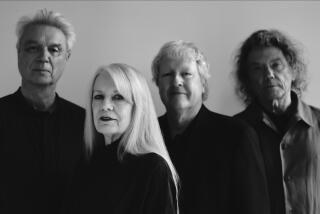Big Star’s Harmonies Look, Sound Better for the ‘90s
- Share via
How big an event, to the cognoscenti, was the first L.A. Big Star show in two decades?
So big that Hollywood insiders otherwise busy posting rumors about record company firings on computer on-line services took time out from the gossip to type up their excitement about the long-dormant band’s return Tuesday.
So big that, if the proverbial bomb had gone off at the House of Blues, some folks would have got their wish for a nearly critic-free, and largely weasel-lessened, city.
So big that even Alex Chilton seemed in a pretty good mood.
Chilton, of course, is the mercurial figure who headed up Big Star, a Memphis group together for only three turbulent years (1971-74). In the history of rock, only the Velvet Underground has claimed such pervasive influence while selling virtually zero records. R.E.M., among many others, cites Big Star as a touchstone; the Replacements named their most popular song after Chilton.
The group’s original sound was British Invasion-infected power pop, but with far darker and more ragged undercurrents that explain why Chilton’s legend is bigger than, say, Eric Carmen’s. That dark side extended to the way Chilton has sometimes seemed intent on sabotaging his own post-B.S. career with erratic genre-crossing, claiming the pop thing was never his bag anyway.
His ornery refusal to kowtow to virtually any demands of the music business has made him all the more revered in alternative circles, but also made the prospect of a Big Star “reunion” about as likely as the Eagles’ royalties freezing over.
*
Yet a year and a half ago Chilton and drummer Jody Stephens were persuaded to re-team for a single gig; replacing the late Chris Bell and retired Andy Hummel were the young frontmen of the Posies, Jonathan Auer and Ken Stringfellow. A terrific live album resulted, as has now, finally, a tour, with the first of Big Star’s two House of Blues shows a near-instant sellout.
Worth the wait? Durn near, even if the old band’s genius may have been overstated in the service of legend. Truth be told, much of this material sounds better now , Posie power having been the ticket for bringing Big Star’s harmonies and proto-power chords into the ‘90s.
Chilton traded his bluesier or jazzier solos with Stringfellow’s Kinks-cum-Badfinger leads, and handed over several lead vocals to both Posies--but as that band always played tunes like “Feel” as if their own, Chilton wasn’t unduly sloughing off duties. His own voice, if anything, sounds more adolescent now, not a bad tone to bring to vintage material that expresses such pre-post-modern sentiments as “I loved you, well, never mind” (from “September Gurls”).
Though hardly overly accommodating in the face of worship, Chilton looked to be having a good time in spite of himself, cracking the occasional smile while copping bossa nova licks in his “Big Black Car” solo or just wondering aloud what, at 43, he was doing singing songs about 12-year-olds. What was he doing? Much as he might hate the idea, fulfilling destiny.
Encore.
More to Read
The biggest entertainment stories
Get our big stories about Hollywood, film, television, music, arts, culture and more right in your inbox as soon as they publish.
You may occasionally receive promotional content from the Los Angeles Times.








